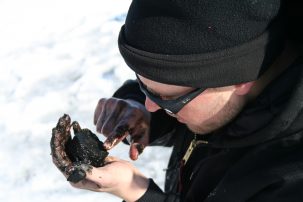paleoclimate3
-

How Can Changing Climate Affect a Civilization?
Billy D’Andrea is trying to understand Easter Island’s climate history over the last few thousand years and how communities dealt with past climate change.
-

Understanding Earth’s Geologic History to Predict the Future
Organic geochemist Pratigya Polissar is developing new tools to look at the history of plants and ecosystems on Earth over the past 20 million years.
-

What the Vikings Can Teach Us About Adapting to Climate Change
The rise of the Vikings was not a sudden event, but part of a long continuum of human development in the harsh conditions of northern Scandinavia. How did the Vikings make a living over the long term, and what might have influenced their brief florescence? Today, their experiences may provide a kind of object lesson…
-

Meltwater Lakes Existed Under Antarctic Ice in Ancient Times
In recent years, scientists have discovered hundreds of lakes lying hidden deep beneath the Antarctic ice sheet. Now a team of researchers has found the remains of at least one sub-ice lake that existed when the ice was far more extensive, in sediments on the Antarctic continental shelf.
-

In a Warmer World, Expect the Wet to Get Wetter, and the Dry, Drier
As the world warms due to human-induced climate change, many scientists have been projecting that global rainfall patterns will shift. In the latest such study, two leading researchers map out how seasonal shifts may affect water resources across the planet.
-

Coring Arctic Lakes to Study Vikings
Billy D’Andrea, a Lamont-Doherty Earth Observatory paleoclimatologist and Center for Climate and Life Fellow, is investigating the relationship between environmental change and characteristics of early settlements in Norway’s Lofoten Islands.
-

Work on Dead Sea Geology Earns Yael Kiro an Award
Yael Kiro, an associate research scientist at Lamont-Doherty Earth Observatory, has received the 2017 Professor Rafi Freund Award from the Israel Geological Society for work published on the ancient climate history of the Dead Sea.
-

Green Sahara’s Ancient Rainfall Regime Revealed
Rainfall patterns in the Sahara during the six-thousand-year “Green Sahara” period have been revealed by analyzing marine sediments, according to new research.
-

Maureen Raymo Elected to National Academy of Sciences
Maureen Raymo, a marine geologist at Lamont-Doherty Earth Observatory whose name is connected with key theories about how ice ages wax and wane and how sea levels change, has been elected to the National Academy of Sciences, one of the highest honors awarded to scientists in the United States.

By studying thousands of buildings and analyzing their electricity use, Columbia Climate School Dean Alexis Abramson has been able to uncover ways to significantly cut energy consumption and emissions. Watch the Video: “Engineering a Cooler Future Through Smarter Buildings“
